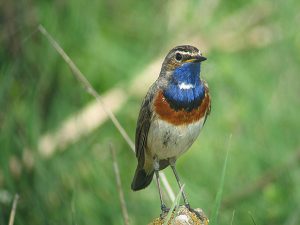
Click here for song.
Today’s Multifaith Mashup focuses on the passage from Psalms found in the Revised Common Lectionary selections for Sunday, May 6, 2018. Here’s the first part of the lection.
Psalm 98
98:1 O sing to the LORD a new song, for he has done marvelous things. His right hand and his holy arm have gotten him victory.
98:2 The LORD has made known his victory; he has revealed his vindication in the sight of the nations.
98:3 He has remembered his steadfast love and faithfulness to the house of Israel. All the ends of the earth have seen the victory of our God.
98:4 Make a joyful noise to the LORD, all the earth; break forth into joyous song and sing praises.
The mystics from various traditions have lots to say about song. Often, however, song is viewed as a manifestation of Divine Relationship or a sign of God being in our midst. Here are a few examples.
Mechtild of Magdeburg
A Christian mystic of the 13th century, Mechtild of Magdeburg is best known for her 7-volume work The Flowing Light of Divinity. In this passage, she suggests that the Great Mystery sings to us.
“Divinity sings this song to our souls: ‘O lovely rose on the thorn! O hovering bee in the honey! O pure dove in your being! O glorious sun in your setting! O full moon in your course! From you I, your God, will never turn away.” (From Christian Mystics: 365 Reading and Meditations by Matthew Fox, New World Library, 2011)
Hasidism
Hasidism is a mystical movement within Judaism that originated in the 18th century in the region now known as Poland and the Ukraine. Many stories are told about the great Hasidic rebbes, and many of their teachings have been preserved in writing. Here are a few of their comments on “song” (from Tales of the Hasidim by Martin Buber, Schocken Books, 1947).
Rabbi Pinchas of Koretz
“Lord of the world, if I could sing, I should not let you remain above. I should harry you with my song until you came down and stayed here with us.”
Rabbi Moshe Teitelbaum on Rabbi Shmelke of Nikolsburg (brother of R. Pinchas)
“When Rabbi Shmelke prayed on a sabbath and on feastdays, but especially on the Day of Atonement when he performed the service of the high priest, the mystery became manifest in the sound of music carrying from word to word, and he sang new melodies, miracle of miracles, which he had never heard and which no human ear had ever heard; and he did not even know what he was singing and what melody he was singing, for he clung to the upper world.”
Rabbi Elimelech of Lizensk
“It is good if man can bring about that God sings within him.”
Jalāl ad-Dīn Rumi
Rumi seems to suggest, in the first part of this poem, that connection with the Beloved IS music. (From The Essential Rumi by Coleman Barks, Harper One, 2004).
“Don’t worry about saving these songs! And if one of our instruments breaks, it doesn’t matter.
We have fallen into the place where everything is music.
The strumming and the flute notes rise into the atmosphere, and even if the whole world’s harp should burn up, there will still be hidden instruments playing.”
By all means, make a joyful noise! But you might also want to consider singing a new song — a song of interfaith harmony that recognizes the wisdom found across the world’s traditions.
Multifaith Mashup provides passages from the writings/sacred texts of other faith traditions that match an excerpt from the Biblical lections offered in the Revised Common Lectionary. Multifaith Mashup is published on Tuesdays and focuses on the lectionary readings for the upcoming Sunday. Questions? Contact us at vicki@worldreligions4kids.com.